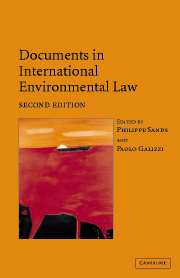Book contents
- Frontmatter
- Contents
- Preface
- PART I General instruments
- PART II Atmosphere
- PART III Oceans: global
- PART IIIB Oceans: regional
- 12 Convention for the Protection of the Marine Environment and the Coastal Region of the Mediterranean, 16 February 1976, as revised in Barcelona, 10 June 1995
- 12A Protocol for the Prevention and Elimination of Pollution of the Mediterranean Sea by Dumping from Ships and Aircraft or Incineration at Sea, 16 February 1976, as revised on 10 June 1995
- 12B Protocol Concerning Co-operation in Preventing Pollution from Ships and, in Cases of Emergency, Combating Pollution of the Mediterranean Sea, 25 January 2002
- 12C Protocol for the Protection of the Mediterranean Sea against Pollution from Land-Based Sources and Activities, 17 May 1980, as amended on 7 March 1996
- 12D Protocol Concerning Specially Protected Areas and Biological Diversity in the Mediterranean, 10 June 1995, and including Annexes adopted on 24 November 1996
- 12E Protocol for the Protection of the Mediterranean Sea against Pollution Resulting from Exploration and Exploitation of the Continental Shelf and the Seabed and its Subsoil, 14 October 1994
- 12F Protocol on the Prevention of Pollution of the Mediterranean Sea by Transboundary Movements of Hazardous Wastes and their Disposal, 1 October 1996
- 13 Convention for the Protection of the Marine Environment of the North-East Atlantic, 22 September 1992
- PART IV Freshwater resources
- PART V Biodiversity
- PART VIA Hazardous substances and activities: nuclear
- PART VIB Hazardous substances and activities: pesticides
- PART VIC Hazardous substances and activities: waste
- PART VII Human rights and the environment
- PART VIII War and the environment
- PART IX Trade and the environment
- PART X Environmental impact assessment and access to information
- PART XI Liability for environmental damage and breaches of environmental obligations
- PART XII The Antarctic
12B - Protocol Concerning Co-operation in Preventing Pollution from Ships and, in Cases of Emergency, Combating Pollution of the Mediterranean Sea, 25 January 2002
Published online by Cambridge University Press: 05 June 2012
- Frontmatter
- Contents
- Preface
- PART I General instruments
- PART II Atmosphere
- PART III Oceans: global
- PART IIIB Oceans: regional
- 12 Convention for the Protection of the Marine Environment and the Coastal Region of the Mediterranean, 16 February 1976, as revised in Barcelona, 10 June 1995
- 12A Protocol for the Prevention and Elimination of Pollution of the Mediterranean Sea by Dumping from Ships and Aircraft or Incineration at Sea, 16 February 1976, as revised on 10 June 1995
- 12B Protocol Concerning Co-operation in Preventing Pollution from Ships and, in Cases of Emergency, Combating Pollution of the Mediterranean Sea, 25 January 2002
- 12C Protocol for the Protection of the Mediterranean Sea against Pollution from Land-Based Sources and Activities, 17 May 1980, as amended on 7 March 1996
- 12D Protocol Concerning Specially Protected Areas and Biological Diversity in the Mediterranean, 10 June 1995, and including Annexes adopted on 24 November 1996
- 12E Protocol for the Protection of the Mediterranean Sea against Pollution Resulting from Exploration and Exploitation of the Continental Shelf and the Seabed and its Subsoil, 14 October 1994
- 12F Protocol on the Prevention of Pollution of the Mediterranean Sea by Transboundary Movements of Hazardous Wastes and their Disposal, 1 October 1996
- 13 Convention for the Protection of the Marine Environment of the North-East Atlantic, 22 September 1992
- PART IV Freshwater resources
- PART V Biodiversity
- PART VIA Hazardous substances and activities: nuclear
- PART VIB Hazardous substances and activities: pesticides
- PART VIC Hazardous substances and activities: waste
- PART VII Human rights and the environment
- PART VIII War and the environment
- PART IX Trade and the environment
- PART X Environmental impact assessment and access to information
- PART XI Liability for environmental damage and breaches of environmental obligations
- PART XII The Antarctic
Summary
Editorial note
The Protocol Concerning Co-operation in Preventing Pollution from Ships and, in Cases of Emergency, Combating Pollution of the Mediterranean Sea adopted on 25 January 2002 has not yet entered into force. The Protocol will replace an earlier 1976 Protocol, which is currently in force. The text of the 2002 Protocol is reproduced below.
The Protocol requires Parties to co-operate to implement international regulations to prevent, reduce and control pollution of the marine environment from ships (Article 3(1)(a)) and to take all necessary measures in cases of pollution incidents (Article 3(1)(b)). Parties, in co-operating, should take into account as appropriate the participation of local authorities, non-governmental organisations and socio-economic actors (Article 3(2)).
Parties are required to endeavour to maintain and promote contingency plans and other means of preventing and combating pollution incidents (Article 4(1)). Parties shall also take measures to ensure the effective implementation in the Mediterranean Sea Area of the relevant international conventions in their capacity as flag State, port State and coastal State to prevent the pollution from ships (Article 4(2)). Parties must develop and apply monitoring activities in this regard (Article 5) and co-operate, as far as practicable, in the salvage and recovery of harmful substances released in specific forms of packaging (Article 6).
The Protocol requires Parties to disseminate and exchange information relating to marine pollution from harmful substances (Article 7(1)). Such information must be transmitted to the ‘regional centre’, which will communicate it to other Parties and, on the basis of reciprocity, to non-Party coastal States (Article 7(2)).
- Type
- Chapter
- Information
- Documents in International Environmental Law , pp. 403 - 416Publisher: Cambridge University PressPrint publication year: 2004



